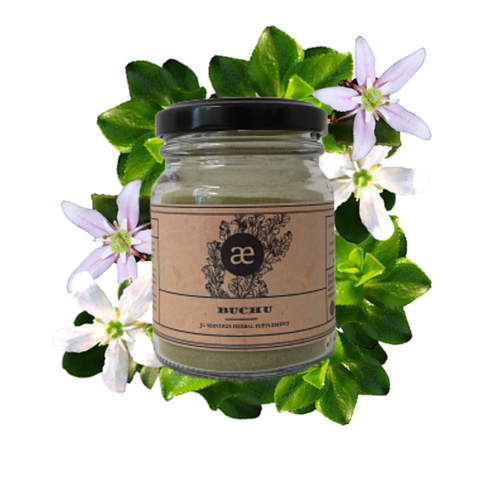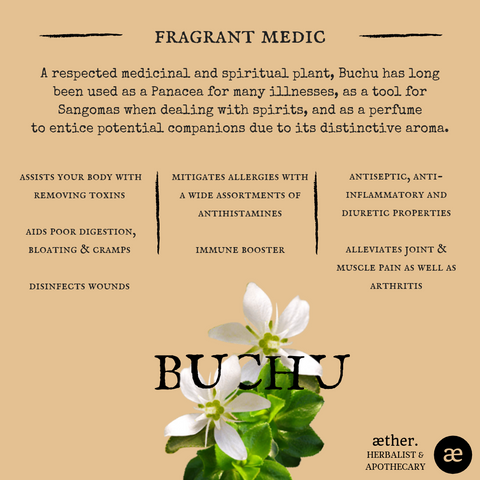PRODUCT INFO
Buchu is perhaps the best known aromatic herb found in South Africa. The use of buchu has a long and esteemed history and was particularly sacred to the native Khoisan. Buchu is a fynbos species and forms part of the cape floral kingdom – the largest in terms of its botanical diversity of all six Floral Kingdoms worldwide.
This sacred herb was highly revered in traditional culture, with stories interwoven with celestial beings and other worlds. The most famous of such stories starts with the deity Khwa - who was the embodiment of rain and water, and whos home ( the waterhole ) was a gate between the worlds of the living and the dead; a gateway between realms.
The tale begins with Khwa coming to earth in the form of a water buffalo. He embarked on a journey, wandering along, his breath forming a gentle mist all around him as he walked. After a while he noticed a delicate fragrance as he breathed in the cool air
He tracked the alluring scent to a small camp where he saw a young sickly woman laying in a hut. Her sister had rubbed buchu over her body, to help her recover, and it was the smell of the herbs which attracted Khwa.
The Rain bull was mesmerized by the fragrance and so he sang to the young maiden. She began to regain her strength and once strong enough, she climbed onto the bulls back and rubbed some buchu onto his head as gratitude. He was filled with elation, and so he turned around and trotted off with the girl on his back.
The two traveled for many days together growing close until one day the young girl needed to return back to the earthly world. The woman asked Khwa to set her down in the shade of a tree next to a waterhole so they may rest. This he did, she thanked him and once again rubbed him all over with buchu leaves, he became so relaxed, he fell asleep. Upon awaking the rain bull had found that his companion had traveled home, he was so delighted that the girl had shared her sweet smelling healing herbs with him, it inspired the deity to stay and bring rain to the plants and creatures of the earth - this is why to this day many traditional peoples still rub buchu over their bodies to bring the rain in times of drought.
Buchus modern history is far more recent with the earliest documentary evidence dating back to 1652, when the Khoisan introduced the herb to arriving Dutch settlers. Buchu’s famed medicinal uses caused its spread to Europe - the first export documented by Reece & co who shipped dried leaves to England in 1821. By the late 19th century large volumes of dried buchu plant material were exported to England and the USA with 8 bales of buchu leaves even listed on the cargo inventory of the Titanic on its doomed maiden voyage across the Atlantic in April 1912.
Historically, buchu has been used to treat inflammation, and kidney and urinary tract infections; as a diuretic and as a stomach tonic. Other uses include carminative action and treatment of cystitis, urethritis, prostatitis, and gout. It also has been used for leukorrhea and yeast infections.
Buchu's major medicinal compounds are its essential oils isomenthone and diosphenol as well as volatile constituents like limonene, menthone, and l-pulegone. The essential oils were found to be active against many pathogens, namely Staphylococcus aureus, Bacillus cereus, pneumonia and Candida albicans making it a great ally to use for various forms of infections. Buchu also has good antibacterial activity, and has been found to be very effective active against gram positive bacteria
Buchu also contains coumarins, these compounds have been found to be active against microbials by stimulating macrophages, allowing the plant to have an indirect ability to increase immune response, where as the flavonoids found in buchu modulate inflammation and strengthen connective tissue helping alleviate arthritis and gout.
Diospenol is responsible for the diuretic action of Buchu, which acts by irritating the gallbladder, causing the production of urine. This can help rid the body of extra fluid, salt and most importantly toxins, revealing strain on the heart, liver and kidneys - this can bring down high blood pressure and swollen tissues.
Buchu also contains flavonoids such as diosmin, hesperidin, rutin, and quercitin which are powerful free radical scavengers ( antioxidants ). They assist in keeping free radicals at physiologically homeostatic levels thus many ailments that result from an increase in oxidative stress are quenched.
Buchu is a very hardy plant but there are limited reserves found in the wild, for this reason we choose to supply cultivated buchu powder, a hydro ethanolic extract to concentrate this herbs varied medicinal qualities and buchu can also be found in our indigenous tonic tincture.
This sacred herb was highly revered in traditional culture, with stories interwoven with celestial beings and other worlds. The most famous of such stories starts with the deity Khwa - who was the embodiment of rain and water, and whos home ( the waterhole ) was a gate between the worlds of the living and the dead; a gateway between realms.
The tale begins with Khwa coming to earth in the form of a water buffalo. He embarked on a journey, wandering along, his breath forming a gentle mist all around him as he walked. After a while he noticed a delicate fragrance as he breathed in the cool air
He tracked the alluring scent to a small camp where he saw a young sickly woman laying in a hut. Her sister had rubbed buchu over her body, to help her recover, and it was the smell of the herbs which attracted Khwa.
The Rain bull was mesmerized by the fragrance and so he sang to the young maiden. She began to regain her strength and once strong enough, she climbed onto the bulls back and rubbed some buchu onto his head as gratitude. He was filled with elation, and so he turned around and trotted off with the girl on his back.
The two traveled for many days together growing close until one day the young girl needed to return back to the earthly world. The woman asked Khwa to set her down in the shade of a tree next to a waterhole so they may rest. This he did, she thanked him and once again rubbed him all over with buchu leaves, he became so relaxed, he fell asleep. Upon awaking the rain bull had found that his companion had traveled home, he was so delighted that the girl had shared her sweet smelling healing herbs with him, it inspired the deity to stay and bring rain to the plants and creatures of the earth - this is why to this day many traditional peoples still rub buchu over their bodies to bring the rain in times of drought.
Buchus modern history is far more recent with the earliest documentary evidence dating back to 1652, when the Khoisan introduced the herb to arriving Dutch settlers. Buchu’s famed medicinal uses caused its spread to Europe - the first export documented by Reece & co who shipped dried leaves to England in 1821. By the late 19th century large volumes of dried buchu plant material were exported to England and the USA with 8 bales of buchu leaves even listed on the cargo inventory of the Titanic on its doomed maiden voyage across the Atlantic in April 1912.
Historically, buchu has been used to treat inflammation, and kidney and urinary tract infections; as a diuretic and as a stomach tonic. Other uses include carminative action and treatment of cystitis, urethritis, prostatitis, and gout. It also has been used for leukorrhea and yeast infections.
Buchu's major medicinal compounds are its essential oils isomenthone and diosphenol as well as volatile constituents like limonene, menthone, and l-pulegone. The essential oils were found to be active against many pathogens, namely Staphylococcus aureus, Bacillus cereus, pneumonia and Candida albicans making it a great ally to use for various forms of infections. Buchu also has good antibacterial activity, and has been found to be very effective active against gram positive bacteria
Buchu also contains coumarins, these compounds have been found to be active against microbials by stimulating macrophages, allowing the plant to have an indirect ability to increase immune response, where as the flavonoids found in buchu modulate inflammation and strengthen connective tissue helping alleviate arthritis and gout.
Diospenol is responsible for the diuretic action of Buchu, which acts by irritating the gallbladder, causing the production of urine. This can help rid the body of extra fluid, salt and most importantly toxins, revealing strain on the heart, liver and kidneys - this can bring down high blood pressure and swollen tissues.
Buchu also contains flavonoids such as diosmin, hesperidin, rutin, and quercitin which are powerful free radical scavengers ( antioxidants ). They assist in keeping free radicals at physiologically homeostatic levels thus many ailments that result from an increase in oxidative stress are quenched.
Buchu is a very hardy plant but there are limited reserves found in the wild, for this reason we choose to supply cultivated buchu powder, a hydro ethanolic extract to concentrate this herbs varied medicinal qualities and buchu can also be found in our indigenous tonic tincture.
INGREDIENTS AND DOSAGE
Buchu Powder- Agathosma betulina
± 60g - 70g
½ teaspoon once a day
up to 3 teaspoons for chronic ailments
PRECAUTIONS
Buchu is considered safe for extended periods of use
There is not enough information about the safety of taking Buchu if you are pregnant or breast feeding. Stay on the safe side and avoid use if reactions occur




